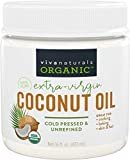
One of the media’s darlings over the past few years has been coconut oil. It’s been called everything from the next great superfood to a cure-all for a host of diseases.
Even with all the potential benefits, the medical community still remains skeptical about coconut oil because of it’s high percentage of saturated fats.
In this article, I’ll discuss about some of the claims and which ones are real and have some science to back it up.
Quick Facts about Coconut Oil
Coconut oil is harvested from the meat of a coconut. It can be processed into oil in a variety of ways, some of which are unhealthy, like the hydrogenation process and the use of the chemical hexane. A lot of the coconut oils produced in the 1980’s were heavily refined which reduced a lot of their benefits and gave coconut oil a bad rep, especially in an era when fat was the enemy.
Most of the coconut oil sold in stores nowadays is labeled virgin (or extra virgin, which virtually means the same thing.) The virgin label means the oil comes from the first pressing of fresh, raw coconuts and no chemicals are added. A good coconut oil will have the word ‘virgin’ somewhere on its label and have a mild coconut flavor and scent.
One Tablespoon of coconut oil contains 117 calories and about 14 grams of fat, 12 of which are saturated. There are some trace amounts of some vitamins and minerals and no protein or carbohydrates so when you eat coconut oil, you are getting just fat.
91% of coconut oil’s calories are from saturated fat. This is far more than butter (64%,) lard (40%) or any other food I could find.
52% of the fatty acids in coconut oil consist of lauric acid which is a medium-chain triglyceride (MCT.) Lauric acid has exhibited numerous antiviral, antimicrobial, and antifungal properties. [1, 2]This is the substance in coconut oil that leads to many of its potential benefits.
Caprylic acid makes up about 9% of the fatty acids in coconut oil and is another MCT. MCTs have less carbon bonds than the more common Long-Chain Triglycerides (LCT) and have some unique properties.
MCTs have about 8.3 calories per gram compared to the standard 9 calories per gram for LCTs. MCTs are also absorbed into the body more rapidly than LCTs and can be efficiently converted into fuel for your muscles and organs.
Importance of Fats
 Before I get into some of the specific claims and potential benefits of coconut oils, let me briefly talk about the importance of fats and saturated fats.
Before I get into some of the specific claims and potential benefits of coconut oils, let me briefly talk about the importance of fats and saturated fats.
Fats are an important part of a good nutrition plan and are especially important if you are following a high-fat ketogenic style diet.
Fats are important for a number of reasons. These include absorption and transport of certain vitamins, maintenance of healthy skin, hair and cell functions as well as many other metabolic functions.
Now that you know a little background about coconut oil, let’s get into some of the claims.
Claim #1: Coconut Oil is bad because of its High Saturated Fat
Saturated fat has been demonized for years and many health organizations, such as the World Health Organization and the American Heart Association, recommend limiting your intake because of a potential link to heart disease.
A 2010 study suggests otherwise. [3]This study could not find any significant evidence of a link between dietary saturated fat and coronary heart disease or cardiovascular disease. A study from 1998 [4,] 2009 [5] and 2010[6] also found no evidence of a link.
Another criticism of saturated fat is that is raises cholesterol. There are many conflicting studies and inconsistent evidence.
One of the most extensive investigations into the causes of heart disease is the Framingham study. This is an extensive multigenerational study that began in 1948 and is still going on today. After decades of research, they could find no relationship between saturated fat intake and blood cholesterol or heart disease. [7]
Verdict: More research needs to be done to support or refute this claim. It is hard to say definitively if saturated fat does or does not raise cholesterol levels because there are conflicting results of the studies on this. From the research I have seen, it does not appear that coconut oil increases the risk of heart disease.
Claim #2: Coconut Oil can Cure Alzheimer’s Disease and Autism
 In 2003 Dr. Mary Newport’s husband, Steve, started to exhibit signs of Alzheimer’s. No medications worked for Steve and his condition got worse.
In 2003 Dr. Mary Newport’s husband, Steve, started to exhibit signs of Alzheimer’s. No medications worked for Steve and his condition got worse.
In an attempt to help her husband, Dr. Newport searched for any cure and found a patent for a drug which had MCTs as it’s main ingredient. The studies for this drug found that it helped to slow and even reverse the effects of Alzheimer’s in a large percentage of the subjects.
Since the drug was not yet cleared by the FDA, Dr. Newport was unable to get ahold of it so she gave Steve daily doses of coconut oil, which are high in MCTs.
His condition improved and his scores on cognition tests assessed that his condition increased from severe to mild. His condition stabilized for around 2 years but then started to decline again.
Dr. Newport’s book, Alzheimer’s Disease: What If There Was a Cure?![]() : The Story of Ketones, detailed her experiences.
: The Story of Ketones, detailed her experiences.
The reason that this may have a positive effect is because the brain can rely on2 forms of energy; glucose and ketones.
Glucose is made from carbohydrates and for most people; this is the primary source of energy for the brain. When the body runs out of glucose, it will start to make ketone bodies from their stored fat. (Creating energy from stored fat is why many people who go on low-carb diets lose weight.)
When inflammation occurs in the brain it develops insulin resistance so it cannot absorb glucose for energy. [8]Since most people still have a lot of glucose in their body, it will not start to make ketones and the brain will not have energy and will start to waste away or degenerate.
When this happens in an older person, this may manifest itself as Alzheimer’s disease and when this happens in a younger person, whose brain is still growing; this can manifest itself as Autism. [9, 10]
MCTs, like the ones found in coconut oil, are easily converted to energy in the form of ketones. If the brain is unable to get the energy it requires from glucose, the ketones can help to supply the brain with the energy it needs and may even be able to stimulate the growth of brain cells to replace the dead or dying ones.[11, 12, 13, 14, 15]
Another common symptom amongst autistic children is abnormal microbial levels in the intestines that can cause digestive problems.
The antimicrobial properties in the lauric acid from coconut oil can help to balance the bacteria in the gut by targeting microorganisms that can harm the body and remain harmless to friendly digestive bacteria.
Verdict: A lot of the findings and anecdotal evidence seems very promising and suggests that this claim may indeed be true for ketone bodies. Since the MCTs in coconut oil can create ketones, it makes sense that coconut oil can be beneficial. Even so, there is still a lack of clinical research to links coconut oil itself to curing Alzheimer’s or Autism.
Claim #3: Coconut oil can treat Epilepsy
Epilepsy is caused by abnormal brain activity that sends out incorrect signals to the body. These neurological disorders cause epileptic seizures, which is uncontrollable vigorous shaking of the body.
Ketogenic diets have been used since the 1920s to control the frequency of seizures. Today they are still used for those people who do not respond well to antiepileptic drugs.
Low-Carb ketogenic diets have been shown to reduce seizures by 30-40%.[16] It has also been shown to be effective with drug-resistant children. [17]
Many people have trouble adhering to a true ketogenic diet because of its food restrictions. Research indicates that a modified diet which includes MCTs allows more carbohydrates and is just as effective as a true ketogenic diet in reducing seizures. [18]
Because of this ability to add more carbs into a diet and still get the benefits of a ketogenic diet, more people, especially children, may be able to stick to their diet for a longer period of time and reduce the occurrence of seizures.
Verdict: Again, much of the evidence indicates that coconut oil can help patients with epilepsy. There is research that shows ketogenic diets helping with epilepsy and coconut oils helping with ketones but there is no study that I found which directly links coconut oil to epilepsy treatment. Common sense would tell us that coconut oil would help though.
Claim #4 Coconut Oil can cure Arthritis
 Arthritis is pain in the joints that can make it hard to move. There are over a hundred different forms of arthritis and the most common treatment method for certain types of arthritis are Nonsteroidal anti-inflammatory drugs (NSAIDs.)
Arthritis is pain in the joints that can make it hard to move. There are over a hundred different forms of arthritis and the most common treatment method for certain types of arthritis are Nonsteroidal anti-inflammatory drugs (NSAIDs.)
Dr. Bruce Fife says that arthritis is caused weakened immune system that allows infection to get into your joints. When the body is unable to fight off the infection the joints become inflamed and painful.
In his book, The New Arthritis Cure![]() , he says that the antimicrobial properties of the lauric acid in coconut oil can kill bacteria including the microorganisms found in arthritic joints.
, he says that the antimicrobial properties of the lauric acid in coconut oil can kill bacteria including the microorganisms found in arthritic joints.
A recent study supported his claim and found that coconut oil reduced arthritis in rats. [19]
Verdict: According to the research it looks like this claim may pan out as well. There are numerous case studies and anecdotal evidence but, I did not find a clinical study that links coconut oil to curing arthritis in humans.
Claim #5: Coconut Oil can help you lose weight
 The two biggest factors in determining whether or not a person will lose weight is their calorie intake and energy expenditure. Coconut oil can help with both of these thus making it easier to lose weight.
The two biggest factors in determining whether or not a person will lose weight is their calorie intake and energy expenditure. Coconut oil can help with both of these thus making it easier to lose weight.
Fats take longer for the body to digest than carbohydrates. They also do not release the hormone insulin, like carbs and protein. Too much insulin can cause a host of health problems including losing the ability to control one’s appetite.
These reasons are probably why high fat, low carb ketogenic diets have been shown to decrease a person’s appetite. [20] It also seems that Medium Chain Triglycerides can reduce appetite more than Long Chain Triglycerides [21, 22] so coconut oil may be more effective than other fatty foods at controlling your appetite.
There is also evidence that suggests that MCTs increase the amount of energy you burn throughout the day by around 5%. [23] For a 2,000 calorie diet, that translates to around 100 calories. That may not seem like a lot, but that is with no additional activity.
MCTs also seem to burn more calories than LTCs. [24, 25]
Verdict: For the people who opt for a high fat diet to lose weight, coconut oil seems to have several advantages over other fats because of their MCTs.
Click here to buy Extra Virgin Coconut Oil![]()
Claim 6: Coconut Oil is good for cooking
 Saturated fats are less likely to react with oxygen when heated. On the other hand polyunsaturated fats, like canola and corn oil, have many molecular bonds, which when exposed to heat, oxidize and form harmful chemicals and free radicals. [26, 27, 28]
Saturated fats are less likely to react with oxygen when heated. On the other hand polyunsaturated fats, like canola and corn oil, have many molecular bonds, which when exposed to heat, oxidize and form harmful chemicals and free radicals. [26, 27, 28]
Polyunsaturated fats can oxidize on the self as well. Coconut oil is solid at room temperature, which makes it very stable and gives it a long shelf life of about 2 years. Most other oils only last for a few months.
The smoke point of oil is the temperature which it will start to burn. The fumes can be harmful for the body because of the toxic chemicals that are created. [29, 30]
The smoke point of coconut oil is around 350 degrees, which is somewhere around the middle of all cooking oils. Avocado Oil![]() and clarified butter have very high smoke points of 485 degrees.
and clarified butter have very high smoke points of 485 degrees.
Verdict: While coconut oil is a lot better option than polyunsaturated oils, it’s smoke point is 350 degrees which does not make it ideal for extremely high heat cooking. I’ve also noticed that coconut oil is not as good at preventing sticking as other oils.
Avocado Oil![]() and Macadamia Nut Oil
and Macadamia Nut Oil![]() both have high smoke points and are mainly monounsaturated fats so may be better options when cooking with extreme temperatures.
both have high smoke points and are mainly monounsaturated fats so may be better options when cooking with extreme temperatures.
Claim 7: Your Hair and Skin can benefit from Coconut Oil
 There have been many claims that coconut oil is great for topical use. Some of these include; that it is a good skin moisturizer, a face cleanser, a makeup remover, cure for acne, a hair conditioner, and can be combined with some sugar and salt for an excellent body scrub.
There have been many claims that coconut oil is great for topical use. Some of these include; that it is a good skin moisturizer, a face cleanser, a makeup remover, cure for acne, a hair conditioner, and can be combined with some sugar and salt for an excellent body scrub.
While all of these claims may in fact be true, I did not find many studies to substantiate all of them.
What I did find was a 2013 study that found that coconut oil was better than mineral oil in treating the skin condition atopic dermatitis. [31]
Another study from 2003 found that coconut oil was effective at preventing hair damage from protein loss. [32] It is hypothesized that the triglyceride structure of coconut oil is better able to penetrate the hair shaft than other oils.
Verdict: There are a lot of people who swear by the use of coconut oil as a topical treatment for improving skin and hair health. There are also a couple of studies that may suggest that the claims have some science backing them up. The previously mentioned antimicrobial benefit of lauric acid may play in some of the benefits that people experience from coconut oil.
Claim 8: Coconut Oil is good for oral health.
 The practice of oil pulling is a folk remedy that has been around for thousands of years.
The practice of oil pulling is a folk remedy that has been around for thousands of years.
Basically this involves swishing oil around in your mouth for a few minutes then spitting it out. The purported benefits of oil pulling include benefits with headaches, migraines, diabetes, asthma, acne and has also been said to whiten teeth. The people that stand by its benefits say that it works by pulling out toxins from the body.
The dental community is not totally sold on the practice though because the lack of research to verify a lot of these claims.
There is some research however that shows that oil pulling can reduce gingivitis [33] and also help reduce plaque [34] but neither study used coconut oil.
Verdict: If oil pulling does have some benefits, I would assume that the antibacterial properties of the lauric acid in coconut oil would enhance these even if there is not a lot of research verifying this.
Summing it up

![]() Of all the claims surrounding coconut oil, none of them seem too outlandish. There is research that suggests that it’s high saturated fat levels don’t elevate the risk of heart disease and it’s effect on cholesterol is debatable.
Of all the claims surrounding coconut oil, none of them seem too outlandish. There is research that suggests that it’s high saturated fat levels don’t elevate the risk of heart disease and it’s effect on cholesterol is debatable.
The research also indicates that coconut oil may have a positive effect with Alzheimer’s disease, Autism, Epilepsy and Arthritis. It also appears to help with weight loss.
As far as cooking, coconut oil is better than a lot of other oils but it’s 350 degree smoke point may limit some cooking at extreme temperatures.
Applying coconut oil to your hair and skin has some prove effects and it’s use in oil pulling can benefit your oral health.
So it seems there are a lot of potential benefits to using coconut oil versus one debatable negative effect.
If you are looking to add coconut oil to your diet many who use it as a treatment suggest about 1-3 Tablespoons a day.
I like to put it in my shake and find it gives it a nice taste. Some people add it to their coffee to make a bulletproof style coffee. I also cook with it if I am not going too high with the heat.
If I am short on my fat for the day, a quick was to add some is just to get a spoon and eat coconut oil.
Click here to buy Extra Virgin Coconut Oil![]()
I hope you enjoyed reading about what coconut oil may do for you. If you enjoyed this article, please subscribe to my email list where you can stay up to date with the latest news and access exclusive content.
You can also reach me via the MBF facebook group or ask me a question on twitter. Stay strong and eat healthy.


